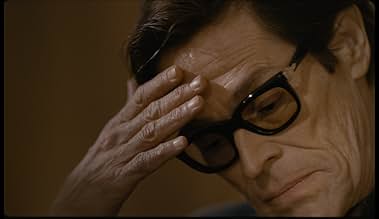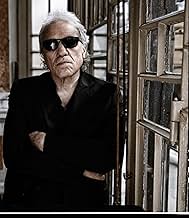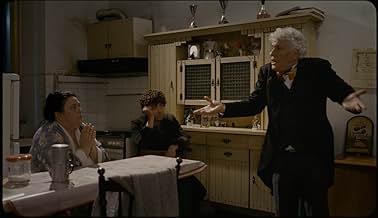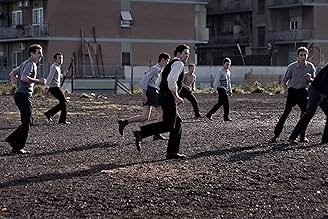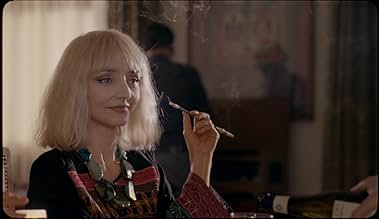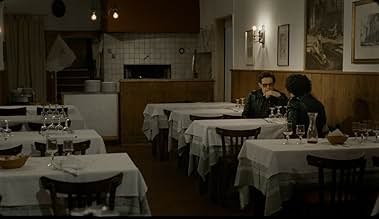IMDb रेटिंग
5.9/10
4.8 हज़ार
आपकी रेटिंग
अपनी भाषा में प्लॉट जोड़ेंA kaleidoscopic look at the last day of Italian filmmaker Pier Paolo Pasolini in 1975.A kaleidoscopic look at the last day of Italian filmmaker Pier Paolo Pasolini in 1975.A kaleidoscopic look at the last day of Italian filmmaker Pier Paolo Pasolini in 1975.
- निर्देशक
- लेखक
- स्टार
- पुरस्कार
- 2 जीत और कुल 5 नामांकन
Luca Lionello
- Narrator
- (वॉइस)
Guillaume Rumiel Braun
- Interviewer
- (as Lucien Rumiel)
फ़ीचर्ड समीक्षाएं
a real good film. for the flavor of the period, for the presence of Ninetto Davoli, for the performance of Willem Dafoe, for the status of precise map for Pasolini's universe, for the passion of director. a film like an old picture. support for memories, reflection, rediscover the name of one of the greatest conscience of Italian XX century. an occasion to understand an universe. not in its profound sense but in its precise borders. at first sigh confuse, it is only expression of absence of courage. Abel Ferrara has not a clear way for explore the world of Pasolini.or the courage to create the painting more than its sketch. but he has an idea. result - few lines, short images, suggestion and words, the interview and the family around the table, the meeting with young man and the dream of a travel to noway. sure, it could be disappointment.the looking for the heart of life is only suggested ignoring its fundamental position in Pasaolini's work. but it remains a good film. for the silences. for emotions. for the pieces of a life who remains an important legacy for our time. because the questions are the same. because the answers are ambiguous. and the voice of Psolini, in his writings, interview or films remains high powerful.
An observational glimpse on the last hours of the famed and controversial Italian director Pier Paolo Pasolini, "Pasolini" is a glacial record of art and society in 1970s Italy. Willem Dafoe plays the complicated artist highlighting the man's torment and humanity. The real life Pasolini's oddball intensity is missing in this portrayal; rather, Dafoe embodies a reserved, cultured homosexual who lived the opposite worlds of cultivated society and the seamy underworld. Amidst this depiction is the backdrop of a turbulent Rome in the throes of political and social unrest. Being an Abel Ferrara flick there's nudity and some graphic sex (both straight and gay) that provides some chuckles and titillation. While not for everyone this highbrow and arty film serves as a compelling tribute to one of the most fascinating artistic figures of the 20th-Century.
Part hero worship, part true-crime tragedy and completely of a piece with its creator's obsessions over the spiritual and the sordid. An unconventional approach to what should be a straightforward biopic, Pasolini's willingness to get lost within the artist's creative perspective while detailing his life creates a powerful and evocative look into the dark world of one of cinema's most controversial figures. It may be only one man's version of what many have speculated about... but its clear-eyed grittiness is also a tribute from a filmmaker for whom the night's temptations were ripe and its dangers legion. In depicting Pasolini's final hours, director Abel Ferrara emphasises the tranquil, serene environment in which his subject worked, the foundation of domesticity that anchored him, though ultimately could not shield him. Despite Ferrara's attempts to generate scandalous imagery of his own, he winds up with many sequences of touching beauty. The jumbling of languages offers a way forward, reaching towards a medium in which modes of communication become equivalent, offset by the marvellous central performance of one of cinema's greatest actors, Willem Dafoe. The idea of a search is a significant parallel between the two intertwined portions of the film, which seem to work towards opposing ends yet culminate in the conclusion of a common node: the art of Pier Paolo Pasolini is inseparable from his death.
Abel Ferrara's long-gestated biopic of Pier Paolo Pasolini has its congenital defect, by cast Willem Dafoe (albeit his striking physical resemblance) as the maestro, hence, the prominent anglophone dialog is rightly incongruous with its milieu and becomes more problematic because the rest Italian cast must follow suit, even for the venerable actress Adriana Asti, who plays Pasolini's senior mother, during a family and friend home-gathering, has to awkwardly keep the conversation going in her heavily accented English, that is a misstep to cut right through a naturally intimate occasion where could have spoken volumes of the internal discord. This language hitch is too big to ignore also because it is erratic, Dafoe manages to converse small talks in Italian (although the credit on IMBb listing that the voice is dubbed), but when he needs to express Pasolini's ideology, he switches to English, as he confesses during the interview with journalist Furio Colombo (Siciliano), paraphrasing here "it is better for me to write than speak about my thoughts", so Ferrara's indecision to stick to one solution chips away the film's potency.
The film begins just days before Pasolini's shocking demise, but Ferrara judiciously doesn't tap into the juicier conspiracy theories spawned from it henceforth, and Dafoe's performance is restrained most of the time, pensively buries his self-consciousness of the impending quietus, his Pasolini is benevolent, intelligent and impermeable. The film only fitfully weaves flashback into its slender narrative (an 84-minute length), the sexual experience in his youth and rambling, indeterminate thoughts, but one of the merits is that Ferrara pays his reverence to piece together Pasolini's unfinished film, envisioning an idiosyncratic "messiah-seeking" journey starring Pasolini's "great love of his life" Ninetto Davoli as Epifanio and Riccardo Scamarcio as Davoli himself answering their calling and witnessing an annual heterosexual copulation ceremony (in the name of procreation) between gays and lesbians (celebrated with pyrotechnics) en route until a cosmic ending commensurate with Pasolini's own fate.
The film is chromatically enveloped with a blue-tinted pall of a grubby Rome in the 70s, and when the brutal crunch finally descends on the night of November 2nd, 1975, Ferrara chooses a more pedestrian cause for the attack but injects his condemnation with one glimpse-or-you-will-miss-it shot where the homophobic perpetrators run over a badly beaten Pasolini when hurrying off the place in his vehicle, it could be the final blow extinguishing his last breath, whether it is intentional or accidental, either way, Ferrara hits home with the happening's incomprehensible cruelty.
Poignancy reaches its apex in Asti's heart-rending breakdown through Maria de Medeiros' Laura Betti, attendant with Callas' stentorian threnody. Ferrara's PASOLINI is a disciple's deferential and cerebral homage to a mentor, whom he has never met and whose myth has been perpetuating around us ever since the horrific tragedy.
The film begins just days before Pasolini's shocking demise, but Ferrara judiciously doesn't tap into the juicier conspiracy theories spawned from it henceforth, and Dafoe's performance is restrained most of the time, pensively buries his self-consciousness of the impending quietus, his Pasolini is benevolent, intelligent and impermeable. The film only fitfully weaves flashback into its slender narrative (an 84-minute length), the sexual experience in his youth and rambling, indeterminate thoughts, but one of the merits is that Ferrara pays his reverence to piece together Pasolini's unfinished film, envisioning an idiosyncratic "messiah-seeking" journey starring Pasolini's "great love of his life" Ninetto Davoli as Epifanio and Riccardo Scamarcio as Davoli himself answering their calling and witnessing an annual heterosexual copulation ceremony (in the name of procreation) between gays and lesbians (celebrated with pyrotechnics) en route until a cosmic ending commensurate with Pasolini's own fate.
The film is chromatically enveloped with a blue-tinted pall of a grubby Rome in the 70s, and when the brutal crunch finally descends on the night of November 2nd, 1975, Ferrara chooses a more pedestrian cause for the attack but injects his condemnation with one glimpse-or-you-will-miss-it shot where the homophobic perpetrators run over a badly beaten Pasolini when hurrying off the place in his vehicle, it could be the final blow extinguishing his last breath, whether it is intentional or accidental, either way, Ferrara hits home with the happening's incomprehensible cruelty.
Poignancy reaches its apex in Asti's heart-rending breakdown through Maria de Medeiros' Laura Betti, attendant with Callas' stentorian threnody. Ferrara's PASOLINI is a disciple's deferential and cerebral homage to a mentor, whom he has never met and whose myth has been perpetuating around us ever since the horrific tragedy.
Defoe is not demanded. A documentary would be more enjoyable, if this could be said.
क्या आपको पता है
- ट्रिवियाNinetto Davoli, who plays Epifanio in this film, has acted in many of Pier Paolo Pasolini's films and was, for a period of time, his lover. He is also a character in the film, played by Riccardo Scamarcio.
- गूफ़Laura Betti (Maria de Medeiros) brings a record as a gift to Pasolini and mentions that it is "traditional Croatian music", but the song that is played from the record is in fact Macedonian.
- भाव
Pier Paolo Pasolini: Let me be frank to you.
Pier Paolo Pasolini: I have been to hell and I know things that don't disturb other people's dreams
- कनेक्शनFeatured in Sportin' Life (2020)
टॉप पसंद
रेटिंग देने के लिए साइन-इन करें और वैयक्तिकृत सुझावों के लिए वॉचलिस्ट करें
- How long is Pasolini?Alexa द्वारा संचालित
विवरण
बॉक्स ऑफ़िस
- US और कनाडा में सकल
- $30,757
- US और कनाडा में पहले सप्ताह में कुल कमाई
- $8,362
- 12 मई 2019
- दुनिया भर में सकल
- $5,51,192
- चलने की अवधि1 घंटा 24 मिनट
- रंग
- ध्वनि मिश्रण
- पक्ष अनुपात
- 1.85 : 1
इस पेज में योगदान दें
किसी बदलाव का सुझाव दें या अनुपलब्ध कॉन्टेंट जोड़ें



